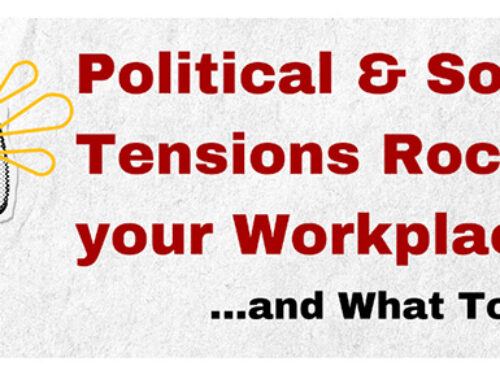

Do you ever feel unsure about what to do when someone on your team creates an awkward moment by saying something overtly disrespectful? Check out these step-by-step instructions on how to deal with the situation in a respectful way.
– – – –
Every now and then somebody at work opens their mouth and “steps in it,” saying something that’s incredibly offensive to just about everyone within earshot. 9 times out of 10, they don’t mean it; they just opened their mouths without thinking. But all of a sudden the place gets very quiet and then everyone tries to hide, followed by someone changing the subject to the weather or asking “how about those (fill in name of local team)?!”
But the poop has been publically stepped in, and without leadership handling it appropriately, the negative hit on group respect, collaboration and teamwork can be costly.
So, if you’re the boss, how do you handle this stuff appropriately in public, especially while you’re still picking up your jaw from the floor? You can use what I call it the “Diversity Diplomacy” technique. The goal of this tool is to de-escalate the situation, diffuse the tension, and ensure that people see you as a thoughtful, respectful leader. The trick is to say something without really saying anything. (NOTE: This isn’t about taking a principled stand, or arguing with the offender or embarrassing them in public; this is about getting everyone to calm down.)
First, you’ve got to get yourself under control, so…
- Buy time to think. Play dumb, like you didn’t understand what they said…”I’m not sure what you’re saying (even though you are), what do you mean?” Usually, they realize they’ve stepped in it and will tone it down the second time. Then, it’s time to diffuse the tension…
- Find common ground. Don’t agree or disagree with their point of view; instead come up with something that everyone can agree on: “I think we can all agree that that’s a loaded topic.”
- Talk about diverse opinions. Obviously, there are different opinions on every topic, so say…”There are lots of opinions on that” OR “On the one hand there are people who feel like you do, and on the other hand there are people who feel differently.” No one can argue with these banal statements; that’s why you say them.
- Defer to higher authority. Offensive remarks often have to do with controversial topics in the news or current culture and are usually not directly ‘work related.’ You can say something like “We’ll have to leave that up to Congress/the Supreme Court/history to solve that issue.” (Try to avoid saying “We’ll leave it up to God.” That’s likely to increase tension with at least few people in the room). Then it’s time to get back to work…
- Deflect. Now that the tension has been reduced by saying one or more of the above statements, it’s time to change the subject…”Maybe we can focus on (whatever the group is working on at the moment)” or “Let’s get back to work.” Everyone will gladly want to do that. (NOTE: deflecting before doing any of the above does not reduce the tension).
Another tactic…
- Be humorous. Occasionally, you can use humor to de-escalate the situation, but it can backfire if you’re not careful. The line I prefer to use is… “Tell us what you really think!” accompanied by a very big smile that everyone can see.
– – – –
Remember, when people “step in it” publically, the goal of the Respectful Leader is to diffuse the tension and keep the environment respectful, not to embarrass the offender or make them wrong. Diversity Diplomacy can help you do that.




